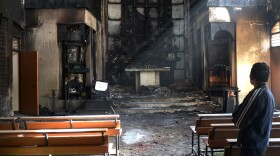
Julie McCarthy
Julie McCarthy has spent most of career traveling the world for NPR. She's covered wars, prime ministers, presidents and paupers. But her favorite stories "are about the common man or woman doing uncommon things," she says.
One of NPR's most experienced international correspondents, McCarthy opened the network's Tokyo bureau, "and never looked back." She has come full circle, recently returning to Asia to open the newest in the constellation of NPR's overseas bureaus in Manila.
In an overseas career spanning 25 years, she's covered Asia, Europe, Africa, the Middle East and South America.
Before assuming her current post as NPR's South East Asia correspondent based in Manila, McCarthy served as NPR's international correspondent based in New Delhi, India, where she spent six years. She'd crossed the border from Pakistan, where McCarthy had established NPR's first permanent bureau in Islamabad.
McCarthy won a Peabody Award for her coverage of Pakistan. She was named the Gracie Correspondent of the Year in 2011, and she was honored with the Southeast Asia Journalists Association's Environmental Award for her coverage of Pakistan's 500-year flood in 2010.
Before moving to Islamabad, McCarthy covered South America as NPR's bureau chief in Rio de Janeiro, Brazil, from 2005 to 2009. She covered the Middle East for NPR from 2002 to 2005, when she was first dispatched to report on the Israeli incursion into the West Bank, and later the war in Iraq and the turmoil in Saudi Arabia.
McCarthy's stint as London Bureau Chief for NPR often took her far afield from Britain. She spent months at NATO covering the war in the Balkans, reported for weeks on the devastating earthquake in Turkey in 1999 and devoted much of summer of 2001 at UN headquarters in Geneva covering the run-up to the Durban Conference on Racism. She covered the re-election of the late Robert Mugabe in Zimbabwe and traveled to the Indian island nation of Madagascar to report on political and ecological developments there.
Following the terror attacks on the United States, McCarthy was the lead reporter assigned to investigate al-Qaida in Europe. She traveled extensively in Iran following the Sept. 11 attacks to report on the Iranian reaction and the subsequent war in Afghanistan.
McCarthy was the first staff correspondent in Japan, assuming leadership of NPR's Tokyo Bureau in 1994. Her tenure there was a rich tapestry of stories including including the Kobe earthquake of 1995, the 50th anniversary of the atomic bombing of Hiroshima and the turmoil over U.S. troops on Okinawa. Her distinguished coverage of Japan won the East-West Center's Mary Morgan Hewett Award for the Advancement of Journalism.
McCarthy's coverage of the Asian economic crisis earned her the 1998 Overseas Press Club of America Award. That same year, McCarthy chronicled the dramatic fall of Asia's longest-running ruler President Suharto and the chaos that followed his toppling from power.
Prior to moving overseas for NPR, McCarthy was the foreign editor for Europe and Africa. She served as the Senior Washington Editor during the first Persian Gulf War. NPR was honored with a Silver Baton in the Alfred I. duPont-Columbia University Awards for its coverage of the conflict.
In her capacity as European and African Editors, McCarthy was awarded a Peabody, two additional Overseas Press Club Awards and the Ohio State Award.
NPR selected McCarthy to spend the 2002-2003 academic year at Stanford University where she won a place in the Knight Journalism Fellowship Program. Her time at the East-West Center in Hawaii in 1994 as a Jefferson Fellow helped launch her long career as an international correspondent for NPR.
McCarthy holds degrees in literature and history, and is a lawyer by training.
-
Some 77 million Indian households depend on kerosene lamps and candles when the sun goes down. Green entrepreneurs are looking to spread the light with affordable solar panels.
-
The Aam Aadmi [Common Man] Party won 67 seats, while Prime Minister Narendra Modi's Bharatiya Janata Party won three. The Congress Party, which until recently ruled India, and Delhi, won nothing.
-
Twice in 10 days, President Obama referenced India and the need to safeguard against religious intolerance. That left Indian television blistering with debate.
-
A week after President Obama cautioned India against "splintering" along religious lines, another Catholic church in New Delhi has been desecrated.
-
Republic Day is marked with a colorful parade and coincides this year with President Obama's visit to India. It was raining but that didn't dampen the spirits of the 125,000 Indians who showed up.
-
Francis is in Asia on a six-day tour intended to build the Roman Catholic Church's following on a continent that holds 60 percent of the world's population but only 12 percent of Catholics.
-
With an assembly line of operating theaters in India, Dr. Devi Shetty is determined to deliver affordable health care to anyone in need.
-
A ruling against J. Jayalalithaa in India's highest-profile corruption case has stunned a political class that is widely seen as permeated with graft. She's been sentenced to four years in prison.
-
Prime Minister Narendra Modi spoke at the U.N. one day after Pakistan's prime minister, Nawaz Sharif. Modi said it's up to Pakistan to create an "appropriate atmosphere" for peace talks.
-
India's Mars Orbiter Mission is set to reach Mars on Wednesday, just days after a U.S. NASA probe began its orbit around the Red Planet. The difference? India did it on a much tighter budget.









